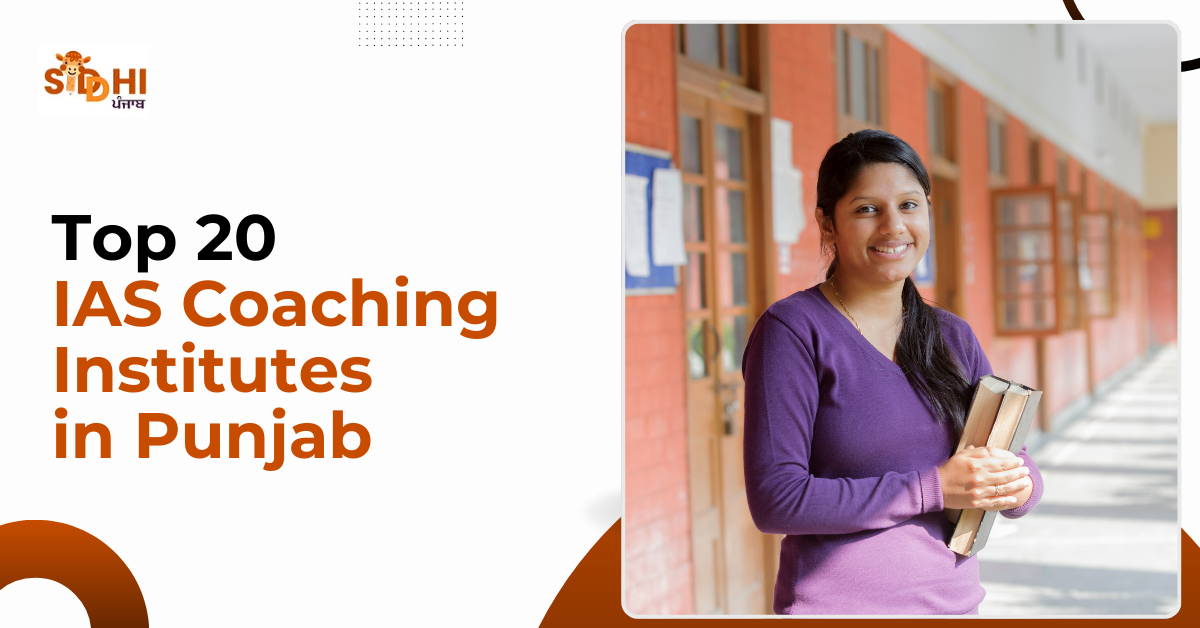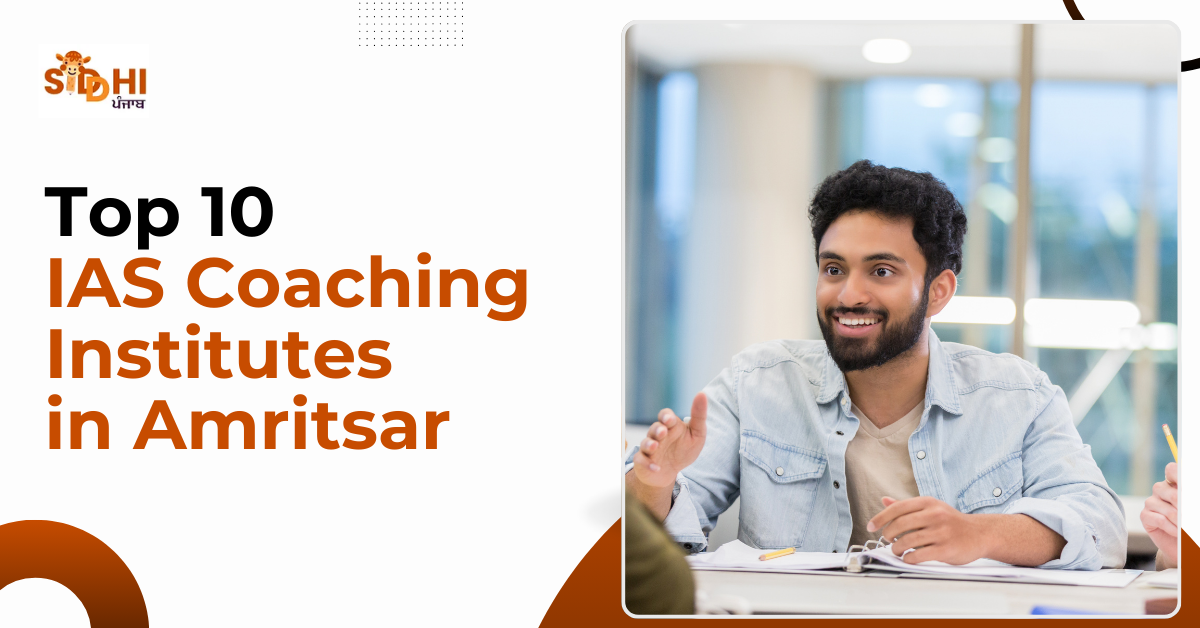Introduction: PCS Exam
If we talk about the PCS exam, known as the most prestigious one. It requires a lot of hard work with smart work to achieve success. To begin the preparation, you first need to understand the exam pattern, which will help you know how many phases the exam has and what kind of paper will be conducted.
In this blog We Siddhi Punjab, will explore the PCS examination pattern with few tips and advice for the exam.
Overview of the PCS Examination Pattern:

State Public Service Commissions (PSCs) conduct the PCS exam in order to hire officers for a variety of administrative positions within a state that includes SDM, DSP, Tehsildar, Block Development Officer (BDO), Labour officer, ETO and others. Every state has its own PCS test, administered by its own Public Service Commission.
The stages of Punjab PCS exam : 3 Stages –
- Stage 1: Prelims Exam: It is an objective based exam.
- Stage 2: Mains exam: It is subjective in nature.
- Stage 3: interview or the personality test.
Let us see the details of these 3 stages of the PCS examination.
Prelims Exam:
Preliminary is the first stage of the exam. A candidate needs to clear the minimum cut off marks to clear the prelims stage and write the mains exam. The cut off varies each year, depending upon the difficulty level of the exam and the number of candidates appearing for the exam. The marks one obtains in this phase have no connection with the final merit.
Here is the cut-off Marks for various categories of students in the Punjab PCS Exam 2020:
General – 244.5 (Female=237.5)
ESM Punjab – 160.5 (Female=137.5)
Sportsperson Punjab – 132.5 (Female=131.5)
Blind & Low Vision – 151
SC other Punjab – 216.5
SC ESM Punjab – 118
Sportsperson Punjab SC – 135.5
Balmiki/Mazhbi Sikh Punjab – 189.5
Balmiki/Mazhbi Sikh ESM Punjab – 140
Mazhbi/Balmiki Sikh Sportsperson Punjab – 111.5
BC Punjab – 243.5 (Female=207.5)
BC ESM Punjab – 135.5
EWS – 205.5 (Female=195.5)
Structure of the Preliminary Examination:
The PCS Preliminary Exam consists of two papers:
-First Paper: General studies paper: In this paper objective type questions from subjects such as polity, history, economy, geography, science, environment, world history, international relations and current Affairs are asked.
-Second paper: The Civil Services Aptitude Test or CSAT exam is also known as General Studies Paper II. Here candidates’ general mental ability is tested through questions on Quantitative aptitude, reasoning, Data interpretation, English comprehension and certain questions from the Punjabi section.
Paper-Wise Breakdown:

-General Studies Paper I (GS Paper I)
-Total Marks: 200
-Number of Questions: Approximately 100
-Time Duration: 2 hours [Visually impaired candidates will be given 20 minutes additional]
-Indian history, geography, politics, economy, science, environment, current affairs, etc. are all included in the syllabus.
This PCS examination measures the candidate’s general awareness and current events knowledge, with a particular emphasis on the state for which the test is being administered.
-General Studies Paper II (CSAT)
-Total Marks: 200
-Number of Questions: Approximately 80
-Duration: Two Hours
-Topics that are Covered in the syllabus: basic numeracy, decision-making, mental ability, comprehension, and data interpretation.
[Note: It’s crucial to remember that the CSAT is not a qualifying exam which means that in order to advance to the Main Examination, the cut off will be calculated by adding marks of GS Paper 1 and CSAT.]
Key Points About Preliminary Examination:
Negative Marking:
There is no negative marking in the Punjab PCS prelims exam.
[Note:]
1) Both the papers will be of objective type which is also known as multiple choice questions here.
2) Duration of each paper for the preliminary examination will be two hours. Visually impaired candidates will be given additional 20 minutes.
3) There will be no negative marking.
4)The question paper will be bilingual, with English (Roman Script) and Punjabi (Gurmukhi Script) printing, with the exception of questions that assess candidates’ language proficiency for the candidates.
5) The standard of questions would be to test the knowledge as is expected of a person at graduation level.
6) The Preliminary Examination is only a screening test for selecting candidates who would be eligible to take the Main Examination and the marks obtained in this Examination shall be towards the merit of the candidates arrived at after the Main Exam that is the second phase.
7) Candidates equal to 12 to 13 times of the vacancies advertised in each category would qualify from amongst those appearing in the Preliminary Examination for the Main Examination. Given that such a number of candidates are available and, are otherwise eligible for admission to the Main Exam .

Snigdha Singla Reddy [Rank 19 in Punjab PCS in 2020] : Founder of Siddhi Punjab
Main Exam:
The second and most important phase of the PCS test is the Main Examination. The results of the Main Exam are taken into account when defining a candidate’s final ranking along with the Interview marks.
The Main Exam’s Structure:
The papers in the PCS Main Exam are of subjective type. There are seven papers including language, essay & GS papers in the mains stage of PCS Exam.
Paper-Wise Breakdown:
-General Studies Papers: 250 marks each
-Number of Papers: 4
-Total Marks of Mains: 1350
-Syllabus Coverage: Indian History, Geography, Economics, Polity, Science, Environmental Studies, International Relations, Ethics, Integrity, and Aptitude are just a few of the topics covered in these papers.
[Note: As written subjective responses are required for the questions in these papers, applicants must develop strong writing abilities in order to convey their knowledge in an organised and concise way.]
Language Paper:
-Marks: 100 marks each (English & Punjabi)
-Syllabus: Tests proficiency in Punjabi and English. This paper evaluates a candidate’s writing ability, comprehension, and translation skills.
Essay Paper:
-Marks: 150 marks
-In essay paper candidates have to write three essays on topics like politics, economics, culture, society, or current events. They have to express their views clearly on the particular topics provided to them.
Key Points About the Main Examination:
-The marks obtained in the Main Examination contribute significantly to the final merit list.
-To succeed at this stage, candidates need to possess good writing and analytical abilities.
[Note:-]
1. Every paper must be of a descriptive character, and it must be three hours long. Applicants with visual impairments will be given an additional thirty minutes for each paper.
2. There will be seven required papers in the main competitive exam.
3. All of the papers, with the exception of the language exams in Punjabi or English, will be available for candidates to take.
4. Candidates using the Punjabi language option for their answers may, if they so want, provide both the Punjabi version and the English translation of any technical terminology that are described in brackets.
5. The question papers there other than language papers will be in English only. However, when any candidate opts for attempting any paper in Punjabi medium, the question papers, printed in Punjabi accordingly.
6. Interview shall be conducted for only those candidates who qualify on the basis of their performance in the main competitive examination and who fulfil the criteria of eligibility.
Also note these 4 things also:
1.Every subject must have the same minimum percentage. In the event that a significant number of applicants fail any major competitive exam with an aggregate score of 45% (or 40% for those from Scheduled Castes and Scheduled Tribes), the Commission may, at their discretion, lower this percentage to not below 40% (read 35% for the candidates belonging to Scheduled Castes and Scheduled Tribes). However, no candidate will be eligible to appear in the interview unless he or she obtains 45% marks in the aggregate of all subjects (read 40% for the candidates belonging to Scheduled Castes and Scheduled Tribes) including at least 33% in each subject.
2. A candidate will not qualify for the competitive examination unless they obtain at least 45% of the possible points in the aggregate across all subjects of the main examination, including interview marks (40% for candidates from the Scheduled Castes and Scheduled Tribes). However, this percentage may be lowered to not less than 40% (35% for candidates belonging to Scheduled Castes and Scheduled Tribes) in any main competitive examination as determined by the authority.
3. Among the candidates who appeared for the Main written examination, the organization will call candidates not exceeding three times the number of vacancies advertised in each category for the Interview, provided that such candidates are available and otherwise eligible for the personality test.
4. Names of qualified candidates shall be arranged in order of merit according to the aggregate marks obtained in the main written examination and the interview.
Note:
If two or more candidates in the main examination receive equal marks in the written and interview portions, the ranking will favor the candidate with higher marks in the written portion. Also, If the marks in the written portion are still equal, the candidate with the higher total score in all general studies papers will receive a higher ranking. If those scores are also equal, the ranking will favor the elder applicant.
For more information, Check out this video:
Orientation Session for Punjab Pcs 2024-25| Contact: 8837604500
Interview or personality test:
The last phase of the PCS exam pattern is the Personality Test/Interview, which is for the candidates who have passed the Main Exam. This round evaluates a candidate’s overall suitability for a career in public service as well as their personality qualities, communication abilities, and capacity to make decisions.
Structure of the Interview:
-Total Marks: 150 marks
-Focus Areas: General awareness, knowledge of the state, communication skills, mental alertness, and leadership qualities.
Senior bureaucrats and experts make up the interview panel, which asks questions to assess a candidate’s problem-solving skills, capacity for working under pressure, and general dedication to public service.
Interview Advice from Siddhi Punjab:
-Keep informed with current events.
-Put an emphasis on communication, leadership, and personality development.
-Because the panel frequently asks questions about the socio-political and economic circumstances of the state. So study everything with state-specific topics.
Have a look what our students says:

Conclusion:
As we have discussed above prior to starting any preparation. It is necessary to understand the exam’s pattern. It enables one to figure out the number of exam phases and the type of paper that will be given. Hope this blog is helpful to you. Above we have discussed deeply about the PCS exam pattern. If left with any queries related to the PCS exam pattern feel free to ask in the comment section.





